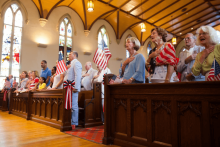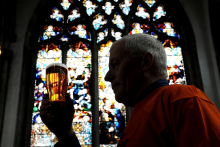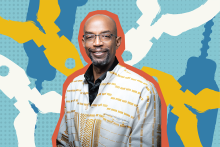Interview

“To me being Christian means f---ing s--- up,” Layshia Clarendon told ESPN’s Katie Barnes. “That’s what Jesus came to do. It means disrupting and fighting for the most marginalized people.” During the 2020 WNBA season, they helped lead players in protesting police violence against Breonna Taylor and other Black women. Clarendon helped launch the WNBA’s Social Justice Council, alongside players like Sydney Colson, Breanna Stewart, Tierra Ruffin-Pratt, A’ja Wilson, and Satou Sabally. Clarendon signed on to the Athletes for Ceasefire in Gaza, and they launched a foundation to provide grants that help transgender people access health care and other services.

In recent years, the work of librarians has been sucked into the center of the “culture wars” as fascist and authoritarian movements in the U.S. attempt to censor materials, especially about queerness and racial justice. Meanwhile, justice movements have recognized how libraries are a shining example of public-funded community goods.

As I remember it, I was first introduced to Jamie Grace’s career while listening to a Christian radio show in 2011. At the time, she was a 19-year-old college student majoring in child and youth development, recently signed to a major Contemporary Christian Music (CCM) label, and was less than a year away from being nominated for the 2012 Grammy Award for Contemporary Christian Music Song. She was a Black woman in an industry largely made up of white men; she was open about her diagnoses of Tourette syndrome, attention-deficit/hyperactivity disorder, and obsessive-compulsive disorder at a time when I wasn’t aware of many people who were; and she was a very skilled guitar player, songwriter, and singer. As such, it seemed obvious that she had a bright future in an industry that needed new energy.

By now, you may know that men, broadly speaking, are suffering. Despite the structure of a patriarchal society where men still reap various financial and social benefits, men are regularly facing disparate outcomes on a wide range of measures. Nearly four times as many men as women died by suicide in the U.S., 1 in 7 men report having no close friends, and men see disparate outcomes in mental health, premature deaths, and education.

Over nearly three decades, Jonathan Wilson-Hartgrove — a self-described “preacher, author, and community builder” — has often played Baruch to Rev. William J. Barber II’s Jeremiah. Through efforts like the Moral Mondays movement and the Poor People’s Campaign, the pair has worked to articulate what they describe as a “Third Reconstruction,” reflected in an agenda that unites the nation’s poor to confront “the interlocking injustices of systemic racism, poverty, ecological devastation.”

At the beginning of their book, Baptizing America, Brian Kaylor and Beau Underwood return to the Christian nationalist display at the U.S. Capitol on Jan. 6, 2022. No, that’s not a typo.

"A lot of psychologists, sociologists, and theologians talk about the fact that forgiveness is really for the forgiver and not the person being forgiven. But that’s not true in a lot of our American narratives [where] forgiveness is actually for the person who did the wrong, so they can be “healed.” We’ve lost the victims in that conversation."

In this week’s conversation with writer and novelist Alessandra Harris, we spoke about her love of writing and when she first realized she wanted to be a writer. She was in fourth grade and the story she had written about a genie was chosen by her teacher to receive a prize. When you’re a kid, there’s just something extremely compelling about the fantasy of encountering a genie who will grant you wishes galore. Of course, as a kid, our wishes are rather innocent and self-centered: “I wish I could meet Michael Jordan,” “I wish the Chicago Bulls could win one more championship,” and, last but not least, “I wish for more wishes.” As you grow up, you realize genies aren’t real but that doesn’t prevent you from imagining what you’d wish for if you had three, two, or even a single wish. And as we age, our wishes tend to transform into a single hope for something innocent and unselfish.

Last week, the University of Michigan announced that it would begin selling alcohol at its football games.
For decades, alcohol sales had been largely limited at college football events, but in 2019 the Southeastern Conference began allowing its schools to sell alcohol at games. Now, more than 80 percent of the top football schools sell alcohol on game day.
In the U.S. church, opinions on alcohol seem more polarized than politics. On the one hand, many conservative and fundamentalist faith traditions treat all alcohol consumption as a sin, some going so far as to suggest that Jesus turned water into nonalcoholic wine. On the other, progressive and moderate faith traditions incorporate alcohol into church with events like beer-and-hymns, theology-on-tap, and “pub churches.”

Ofer Cassif, whose grandparents came to Israel from Poland in 1934 as part of the Zionist movement, is a secular Israeli Marxist and a leading voice against the war in Gaza. During the first Palestinian Intifada in 1987, Cassif refused Israeli military service in the Occupied Territories and was incarcerated in military prison. In 2019, he was elected to Israel’s parliament as the only Jewish member of the Arab-majority Hadash-Ta’al party. In January, Cassif publicly supported South Africa’s petition to the International Court of Justice (ICJ) to investigate Israel for violation of the 1948 Genocide Convention in its war on Gaza. In February, some parliament members tried — unsuccessfully — to impeach him.

Anyone who has spent even a second in a prison knows it’s hell. Growing up in church, I noticed people who participated in the church’s prison ministry were both respected and feared. Respected because they were doing what the writer of Hebrews admonishes believers to do regarding those in chains: Remember them as though you were in prison with them (13:3). But they were feared because many of them had actually been in prison. Rather than the prison system or the criminal legal system being classified as barbaric, it was the prisoners who were typically understood to be barbarians.
Joe Ingle has spent a lot of time in prison. Ingle is a writer and death row minister who has been active in prison ministry since the ’70s. A native of North Carolina and a graduate of Union Theological Seminary, Ingle has dedicated his life to being present with and advocating for the 1.9 million people incarcerated in the U.S., especially the more than 2,300 incarcerated people on death row.

Only 1 in 4 adults play sports each year, according to a 2015 study from NPR, the Robert Wood Johnson Foundation, and Harvard University’s T.H. Chan School of Public Health. This is despite nearly three in four respondents reporting playing as kids, and a majority of adults saying sports improved their mental and physical health ... Ashley Lynn Hengst sees opportunities for the church to help decrease those disparities and build space for more people of all ages to play sports. Hengst serves in pastoral care at All Saints Church in Pasadena, Calif., after a decade working for the Y in youth development.

Brenda Salter McNeil is an ordained minister in the Evangelical Covenant Church, associate professor of reconciliation studies at Seattle Pacific University, and the author of multiple books on the topic of racial reconciliation. McNeil is acutely aware of critical attitudes toward racial reconciliation and is seeking to emphasize the importance of reparations and intersectionality in her new book, Empowered to Repair. I sat down with McNeil to talk about reconciliation, Obama, and Black support for former president Donald J. Trump.

Every few months, a headline flashes across my news feed: “Climate change could destroy the coffee industry,” or something similar.
Even as a regular coffee drinker, what concerns me isn’t the change to my morning cup, it’s the lives and livelihoods of the farmers who plant, grow, cultivate, and prepare my coffee beans. The majority of coffee is grown in the global South, which is alsobearing the brunt of climate change. Meanwhile, a majority of the world’s carbon dioxide emissions also come from the global North.

If you’re the type of person who discusses politics online, you’re likely to have heard of Godwin’s law. In 1990, Mike Godwin, a First Amendment lawyer, invented this rule to address a common occurrence: The longer online debate drags on, the more likely someone commits the fallacy of reductio ad Hitlerum — i.e., the comparison of someone or something to Adolf Hitler or the Nazis.
Invoking Nazis, as Godwin suggests, is a lazy way of ending a debate. I also think it’s usually motivated by a shallow understanding of history and an insensitivity toward Holocaust victims.
But there’s gotta be times when referencing the Nazis is warranted, right? I’ve been thinking about this a lot lately as U.S. politics continues down the path of polarization and a segment of Christians unabashedly preach a message of domination. We need a sharper critique of Christian nationalism and the Republican presidential candidate Donald J. Trump that’s deeper than simply labeling the former group as “Nazis” and the latter individual “Hitler.” But where do we begin?

Reverend Christopher Carter is a virtue ethicist, commissioned elder in the United Methodist Church, and professor of theology. He has spent much of his professional and personal life learning to better the treatment of animals as part of an integrated approach to justice for all. Carter, the author of The Spirit of Soul Food: Race, Faith, and Food Justice, defines his work as a practice of “Black veganism,” which “forces us to examine how the language of animality and ‘animal characteristics’ has been a tool used to justify the oppression of any being who deviates, by species, race, or behavior, from Western Christian anthropological norms.”

I was in high school, visiting my grandparents’ church in Peru, Ind., and the theme for the Sunday school class was “money.” The teacher was quick to bring up a verse that has always sounded like it would be a better fit in Benjamin Franklin’s Poor Richard’s Almanack than the Bible. “The love of money is the root of all evil,” the teacher said, summarizing and abbreviating 1 Timothy 6:10. “It’s not that money itself is evil. Objects, in and of themselves, cannot be evil,” he explained. “It’s a matter of the heart.” That logic sat weirdly with me and so I raised my hand to respond. “Don’t we believe that idols are objects and that they are evil? Also, doesn’t the Bible teach us to resist temptation? So wouldn’t it make sense to resist the temptation of money to avoid all the evil that comes with it?”

According to a study by The Washington Post, in states where data was available, homeschool students rose by 51 percent between 2017 and 2023. By comparison, enrollment in private schools rose by only 7 percent. As a homeschool alum, these statistics brought me mixed feelings. I had a beautiful, generous, enriching experience being homeschooled from fifth through 12th grade, but I know others who had the complete opposite experience. I fear that many Americans are beginning to homeschool without knowing that Far-Right, fundamentalist Christians lead most of the networks that offer resources to homeschooling families.

The effects of personal religious belief are everywhere in politics, from the rallying sermons of Rev. Martin Luther King Jr. to Christian nationalists citing biblical justice when Roe v. Wade was overturned. For queer people, R. G. Cravens argues, faith is more than a motivating factor — it can be a way into political engagement. His research shows religious LGBTQ+ people are more politically active than nonreligious LGBTQ+ people. In fact, religion often facilitated political activity, from congregations marching together at Pride events to organizing letter-writing campaigns to government officials.

I originally met educator and grassroots theologian David Leong in 2016 after I emailed him on a whim, telling him I was coming to visit friends in Seattle and that I’d like to meet him for coffee. I had just read an advanced copy of his book Race and Place, about churches in urban contexts, and was impressed by the conversational tone it took when addressing issues like race, class, and gentrification.